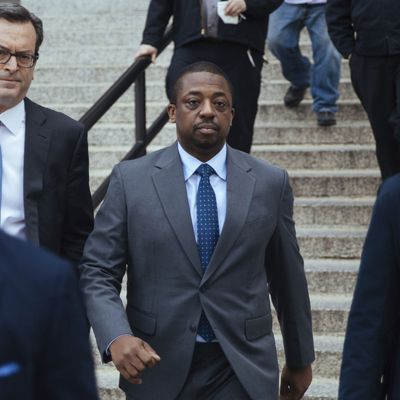
For weeks, Lieutenant Governor Brian Benjamin was dogged by reports that investigators were looking into him as part of a probe into campaign finance fraud. Then in mid-April, he surrendered to authorities as Manhattan federal prosecutors unsealed an indictment that charged the lieutenant governor on five counts, including bribery. They allege that Benjamin used his previous position as a state senator to direct $50,000 in state funds to a real-estate developer in exchange for thousands of dollars in donations to Benjamin’s unsuccessful 2021 campaign to be city comptroller. He resigned from office hours after he pleaded not guilty and was released on a $250,000 bond that same day.
Benjamin is just the latest in the seemingly never-ending revolving door of New York state politicians who have stepped down following accusations of political corruption — from legislative leaders such as State Assembly speaker Sheldon Silver and Senate majority leader Dean Skelos, who were both convicted on federal corruption charges, to statewide officeholders including Eliot Spitzer, who resigned as governor after it was revealed that he was a patron of a high-end escort service.
The indictments against Silver and Skelos were made possible from leads by the Moreland Commission to Investigate Public Corruption, a panel formed by then-Governor Andrew Cuomo to root out corruption in state politics. Cuomo later dissolved the commission following the passage of new ethics laws in the legislature, prompting Preet Bharara, the U.S. Attorney of the Southern District of New York at the time, to continue some of the panel’s investigations.
Richard Briffault, a professor at Columbia Law School, has particular insight into New York’s long-running corruption problem. A previous member of the Moreland Commission and the prior chair of the New York City Conflicts of Interest Board, he discussed why the state is so crooked in a recent interview.
What was your reaction to the news about Brian Benjamin?
Well, I mean, a couple different things. One is “There we go again,” in the sense of the number of senior people in state government who have been caught in various scandals over the last 10 to 15 years. Some of them are more personal, like Governor Eliot Spitzer or Attorney General Schneiderman, but some of them look more like traditional corruption, like Speaker Sheldon Silver, Majority Leader Dean Skelos, Alan Hevesi, comptroller some years back. And this is kind of classic corruption.
What do you think we can expect to see in the coming weeks?
In some ways, I think the indictment of him is pretty straightforward. Obviously the government has to make its case on the facts. I’m assuming based on newspaper accounts that Benjamin’s counsel is going to try and make an argument that this doesn’t fit the model of corruption because he himself didn’t get any money out of it. I don’t know that that’s a winning argument, but I’m sure they’re going to try.
The other, of course, is what’s going to happen with the position. Will the Democrats be able to get him off the ballot? I know there’s already a bill or at least a proposal, I don’t know if it’s actually in the legislature, to amend the law to make it somewhat easier for somebody to resign their nomination, which seems to make sense. Somebody has already resigned the job. They should be able to resign the nomination for reelection. The next one is, you know, the governor is going to have to decide whether she wants to appoint somebody and I guess be super careful about how she does it.
The indictment against Benjamin seems to indicate that he wasn’t entirely truthful during the vetting process for the governor’s ticket, and Governor Hochul has said that she believed that he passed his background check. Do you think the traditional vetting processes that are used are robust enough to catch some of these red flags early on, or are some changes necessary?
I obviously can’t speak to what they actually did in terms of how much they probed. I mean, on the one hand, you’re hopeful that people will be truthful, but I guess you can’t count on it — particularly if the stakes are high enough. This underscores the need to have a pretty thorough investigation, especially in a situation like this where it wasn’t an election to become lieutenant governor where somebody personally is out there campaigning and there’s an opponent who’s going to be scrutinizing. This all happened fairly quickly. I mean, you understood why. She’d only just become governor and just wanted to make sure there was a backup there. But you know, during the course of a long campaign, it’s more likely that critical things will come out. And of course, something quick like this, when it was also being done kind of behind-the-scenes. I mean, it just underscores the need to maybe take more time and have the opportunity for a more thorough investigation to check into the statements that a candidate is making.
New York has unfortunately garnered a reputation for political corruption that’s sometimes only rivaled by states like Illinois. Obviously, they’re not the only places where these things happen, but is there something unique about New York and Albany and how their politics function that lends itself to these scandals?
I think the notion of using your public position to do favors for someone so they’ll do favors for you, that’s not unique to New York. There’s often the argument that things are often worse in a place where the state capital is more remote from the center of activity, in the way that Albany is remote from New York City, and some people have argued that when state capitals are further away, there’s less immediate scrutiny. But I don’t think this has anything to do with that. This, I think, it’s just the classic example of “I will use my public influence to do something for you if you use your private position to do something for me.” And that’s, you know, that kind of deal-making is everywhere. The particular deal here involves some illegalities, like the use of straw donors to get New York City public funding. But the underlying deal-making that comes close to the line — when is a deal a deal? When is a deal just politics, and when is a deal corrupt, is often a very hard question.
Some people have made the argument that a state or even a city that’s controlled by one political party is more likely to have higher levels of political corruption and shady deal-making.
In New York, we’ve seen it on both sides. I mean, maybe the better way to put it is you can only make these kinds of deals if you’re in a position of power. And it could be in a one-party jurisdiction or it could be in a two-party one, where the two parties themselves make some deals about splitting up who gets to call and how many chips. So I’m not sure that’s the key thing. I think it’s more, you know, there is a kind of acceptance of a certain level of deal-making. And it’s hard to police when a deal is, we’ll just call it traditional politics, and when a deal crosses a line and becomes criminal.
In the past, you served on the Moreland Commission and also on the Conflict of Interests Board. What did those roles teach you about the nature of public corruption in the state?
A couple of things. One is that it’s important to drill into the idea that these jobs are public-service jobs. They’re not there for your personal gain. That’s obviously very important. Second, you need to have effective oversight and enforcement agencies. It’s unfortunate that, at least in New York, so often the enforcement is coming from federal prosecutors rather than from the state itself. But you need to have good rules. Unfortunately, sometimes you can have good rules and people still violate them. And that’s really what happened in the Benjamin case — just getting the straw donors, getting contributions to be made in the name of other people so they would fall under the threshold that allows them to be matched. There’s no rule that could prevent that, but doing that is illegal. So the real trick was figuring out that that’s what was happening. And I understand that some of this came from the Campaign Finance Board noticing that some of their checks were sequential. I don’t know enough about how the investigation of this went, but there may have been some, you know, even basic administrative things that help catch misconduct. I mean, I think there, at least the rule was clear, and it was just broken. And in some ways, it’s hard to prevent people from just breaking the rules.
I should say that they claim that the rule was broken. The government’s got to prove the facts. The factual allegations are pretty clear. This was a pretty straightforward set of relations and claims. They have to prove them, but it’s pretty straightforward.
There have been many attempts to rein in political corruption, such as the Moreland Commission and also JCOPE, the state’s ethics commission that has been criticized for not being substantial enough. In your view, what are some actions that could be taken by lawmakers right now to combat this issue?
This particular incident, it’s not clear that there’s a lot that could be done. The main thing is the idea that there can be member items, which in effect, as I understand from the indictment, is Benjamin basically being able to promise his donor that he would be able to put something specifically in the budget for the donor. The more you can have these kinds of member items, which are very popular, the easier it is that they can be corrupted. They’re pretty straightforward, such as grants that are often to community-based organizations. There’s a lot of appeal in the ability of public officials to direct money to community-based organizations that may do good work. But they are the basis of a kind of deal-making that can lead to a situation like this.
So one thing is either to ban them or to have much more disclosure about who gets the benefit from them so it can be a better matter of public record. This is a hard one to draw a lot of lessons from because, in some ways, it was not that complicated. At least, the violation of the campaign finance law was very clear. I don’t think you could write the law any differently to prevent this from happening. It’s a matter of capturing it. But you know, in the quid pro quo, the reason that it was attractive to the donor was the ability to violate the campaign finance laws in order to get a large grant from the state. And so maybe you have to work on that side of it, the ability of an individual to direct state funds in that relatively unaccountable way.
Would you say the Benjamin situation was more of a situation where the laws detected it in the way it should’ve been?
I think that’s right. Obviously the system was broken, but the system caught it. I mean, you could say it’s unfortunate that it took federal law enforcement to catch it and it wasn’t caught by state law enforcement. And I don’t know why that is, and that’s, I think, a deeper question as to why so many of our state corruption cases are being brought by the Southern District or the Eastern District and have not been brought by the DA. That’s a separate question, and I don’t know the answer to that. It’s not clear to me that this is a matter of writing new laws. The law was relatively clear, and the guy broke it, or at least that’s the claim.
This interview has been edited and condensed.






























